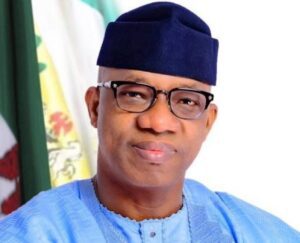
Online voting will promote democracy and civic engagement — Founder TECHmIT, Adepoju
Oluwaseun David Adepoju is a creative technologist, the founder of TECHmIT Africa and a curator of a collective called ‘ghetto silience.’ The firm seeks to accelerate technological resilience in underserved communities in Africa. In an interview with MOYOSORE SALAMI, he speaks on the significant role technology played in shaping politics today
What are some of the most significant ways technology is shaping politics today?
Technology is fundamentally changing the way politics is done today. One of the most significant ways technology is shaping politics is through the use of social media platforms. Social media has become an integral part of political campaigns and a powerful tool for engaging with constituents. Additionally, data analytics and machine learning algorithms are being used to target specific voters and craft tailored messaging. This can lead to more effective campaigning but also raises concerns about manipulation and privacy.
What are some of the biggest challenges and concerns related to technology and politics?
One of the most significant challenges related to technology and politics is the issue of privacy. With the rise of big data and artificial intelligence, there is a growing concern about how personal data is being collected, used, and shared by political campaigns. There is also the issue of disinformation, where false or misleading information is spread through social media, leading to a polarised public discourse. Bias is another concern, as algorithms can perpetuate and amplify existing biases, resulting in discriminatory outcomes.
How can technology be used to promote democracy and civic engagement?
Technology can be used to promote democracy and civic engagement by facilitating access to information, enabling online voting, and fostering public discourse. Social media platforms can be used to promote political engagement and mobilise voters, while digital tools can make it easier for individuals to participate in the political process.
What are some potential solutions to the challenges posed by the intersection of tech and politics?
The intersection of technology and politics poses several challenges that require innovative solutions. One potential solution is increased transparency and accountability for tech companies, particularly in their handling of personal data and use of algorithms. This can be achieved through regulation, such as the GDPR in the EU, or through industry self-regulation. Another solution is to promote digital literacy and critical thinking skills among the public to combat disinformation and online manipulation.
What role should the government play in regulating social media and other tech platforms?
Regarding the role of government in regulating social media and other tech platforms, there is a need for balanced and informed policymaking. Governments should ensure that tech companies uphold ethical standards and protect users’ privacy and data, while also balancing free speech and innovation. It is crucial to strike a balance between protecting users and promoting innovation.
How do you see emerging technologies like AI and blockchain changing the way we live and work?
Emerging technologies like AI and blockchain have the potential to revolutionise the way we live and work. AI can automate repetitive tasks and enable more personalised experiences, while blockchain can enhance security and transparency in transactions. However, these technologies also raise concerns about job displacement, privacy, and ethical considerations around AI development and deployment. I believe we can get the best out of these technologies and understand how to regulate them better with time.
Cybersecurity is becoming an increasingly important concern for individuals and businesses alike. What are some of the most pressing cybersecurity issues that we need to be aware of?
Some of the most pressing cybersecurity issues we need to be aware of include data breaches, ransomware attacks, and phishing scams. These attacks can compromise personal data and financial information, causing significant harm to individuals and businesses alike. It is crucial to stay informed about cybersecurity threats and take proactive measures to protect ourselves and our organisations.
With the rise of remote work and the gig economy, how do you see technology shaping the future of work?
Technology is transforming the future of work by enabling remote work, freelancing, and the gig economy. With the rise of digital platforms, individuals can work from anywhere and take on projects that align with their skills and interests. Working in the future will be more of “experience” than “employment” with the rise of more distributed systems technologies. Global collaboration will continue to increase and distributed team systems at organisations will become mainstream. However, this also raises concerns about job security, income inequality, and the need for new policies and regulations to protect workers’ rights.
Do you think technology can be used to address some of the world’s challenges such as climate change, inequality?
Technology can certainly be used to address some of the world’s challenges, including climate change and inequality. For example, AI and machine learning can help optimise energy consumption and reduce waste, while blockchain can enable transparent and secure transactions in the fight against corruption and inequality. However, technology is not a silver bullet, and it needs to be complemented by broader policy and societal changes.
What is your advice for young people who are interested in pursuing a career in technology?
For young people interested in pursuing a career in technology, my advice would be to stay curious and keep learning. Technology is constantly evolving, and it is essential to stay up-to-date with the latest developments and trends. Building a strong foundation in computer science, mathematics, and critical thinking will provide a solid base for a career in technology. It is also crucial to develop soft skills, such as communication and teamwork, as technology often requires collaboration across different domains and disciplines.



